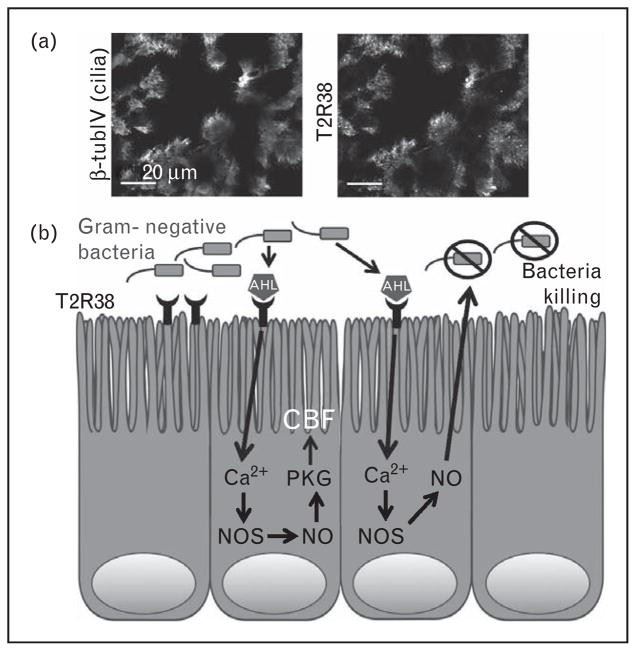Introduction of TAS2R38
Taste receptor type 2 member 38 (TAS2R38) belongs to G protein-coupled receptors family, which is encoded by TAS2R38 gene. Compared with other members of GPRs family, TAS2R38 also has an N-terminal extracellular domain, a C-terminal cytoplasmic domain, and a seven-transmembrane domain constituted with α-helix. Usually, the third α-helix is highly conservative revealing the important function of stability maintenance and receptor activation. TAS2R38 polymorphisms are very common in different populations, resulting in distinct sensitivity to bitter taste and food intake.
| Basic Information of TAS2R38 | |
| Protein Name | Taste receptor type 2 member 38 |
| Gene Name | TAS2R38 |
| Aliases | T2R38 |
| Organism | Homo sapiens (Human) |
| UniProt ID | P59533 |
| Transmembrane Times | 7 |
| Length (aa) | 333 |
| Sequence |
MLTLTRIRTVSYEVRSTFLFISVLEFAVGFLTNAFVFLVNFWDVVKRQALSNSDCVLLCLSISRLFLHGL LFLSAIQLTHFQKLSEPLNHSYQAIIMLWMIANQANLWLAACLSLLYCSKLIRFSHTFLICLASWVSRKI SQMLLGIILCSCICTVLCVWCFFSRPHFTVTTVLFMNNNTRLNWQIKDLNLFYSFLFCYLWSVPPFLLFL VSSGMLTVSLGRHMRTMKVYTRNSRDPSLEAHIKALKSLVSFFCFFVISSCVAFISVPLLILWRDKIGVM VCVGIMAACPSGHAAILISGNAKLRRAVMTILLWAQSSLKVRADHKADSRTLC |
Function of TAS2R38 Membrane Protein
TAS2R38 is traditionally known as a member of taste receptor family 2 (T2R) bitter taste receptors, and it was originally identified in type 2 taste cells of the tongue, where it may play a role in the perception of bitterness or potentially harmful ingested chemicals and is gustducin-linked. The activation of TAS2R38 stimulates alpha G-protein gustducin, then mediates PLC-beta-2 activation and leads to the gating of TRPM5 (a calcium-activated non-selective cation channel), finally induces transmission of the taste signal. Recent research has demonstrated that TAS2R38 is also expressed in cilia of sinonasal epithelial cells, suggesting a role for TAS2R38 in sinonasal innate immunity and chronic rhinosinusitis. Activation of TAS2R38 in sinonasal epithelial cells can stimulate nitric oxide production, increasing ciliary beating and directly killing bacteria. Polymorphisms in TAS2R38 is closely linked to both impaired innate immune response and gram-negative infection and chronic rhinosinusitis (CRS). Furthermore, TAS2R38 may be associated with the risk of gastric cancer.
 Fig.1 TAS2R38 in sinonasal innate immunity. (Lee, 2015)
Fig.1 TAS2R38 in sinonasal innate immunity. (Lee, 2015)
Application of TAS2R38 Membrane Protein in Literature
This article reports that beyond the type 2 taste cells of the tongue, T2R38 is also expressed in sinonasal-ciliated epithelial cells, where it detects bacterial quorum-sensing molecules and regulates nitric oxide-dependent innate immune responses. Genetic variation of TAS2R38 will decrease the innate immune response in the defense against bacteria.
The authors demonstrate that gene variants of TAS2R38 are associated with alterations in individual sensitivity to bitter taste and food intake. And the variants may significantly increase the risk for diet-related diseases, such as gastric cancer.
This article presents 6-n-propylthiouracil (PROP) sensitivity data of 97 individuals that have been observed to carry rare haplotypes (AAV, AAI, PAI, PVI) of the TAS2R38 gene. They found the PAV haplotype is the most sensitive to taste, the AAI, AAV, and PAI haplotypes present intermediate taste sensitivity.
This article reveals that TAS2R38 is highly expressed in sinus mucosa (SM) of chronic rhinosinusitis (CRS) patients. The genotypes PAV and AVI are very common in patients with CRS. The protective genotype (PAV/PAV) is noticed in the lowest frequency.
This article indicates that TAS2R38 plays a major role in glucagon-like peptide 1 (GLP-1) release. And the gastrointestinal (GI) lumen location of TAS2R38 is a relatively safe drug target as systemic absorption is not needed for a TAS2R38 agonist drug to effect GLP-1 release.
TAS2R38 Preparation Options
To obtain the soluble and functional target protein, the versatile Magic™ membrane protein production platform in Creative Biolabs enables many flexible options, from which you can always find a better match for your particular project. Aided by our versatile Magic™ anti-membrane protein antibody discovery platform, we also provide customized anti-TAS2R38 antibody development services.
Creative Biolabs has extensive experience to accomplish the membrane protein preparation, a huge technical problem in protein engineering, which helps us win a good reputation among our worldwide customers. Numerous challenging projects choose us based on our forward-looking research, rich technical force, and highly cooperative group. Please feel free to contact us for more information.
Reference
All listed services and products are For Research Use Only. Do Not use in any diagnostic or therapeutic applications.